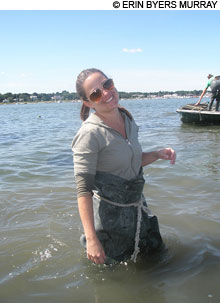The first time I ate an oyster it was swamped with a tangy mignonette to avoid any hint of unpleasant squishy sea-creatureness. The second time, it was naked, secretly passed to me through the garde-manger at the restaurant where I waited tables. I slurped it in hiding, tossing the craggy shells in the trash before a manager came around the corner. It was a Wellfleet — a sharp slap of salinity upfront, with a mellow, mossy finish. I felt like a badass, and the line cook who handed it to me looked impressed.This was the extent of my relationship with oysters before I read Shucked: Life on a New England Oyster Farm, by Erin Byers Murray. The memoir tracks Murray's one-year hiatus from her job as editor of DailyCandy.com, during which she joins the crew of Island Creek Oysters in Duxbury to gain a better understanding of just where her food — and oysters in particular — comes from.
Murray's writing is honest (hauling oyster crates and splashing around in icy water is no picnic) and personal (sometimes a marriage takes a few hits in the pursuit of personal dream fulfillment), and consistently maintains an elegant balance between oyster facts and Murray's musings and observations. There's no need to skip through pages filled with academic, encyclopedic background info on the biological processes of bivalves; I came away from each chapter learning something about one of the fastest growing industries on the East Coast (home to at least 11 different oyster hubs), and also feeling as though I'd slogged through the mud all day alongside Murray and her Island Creek crew.
The premise is at once glamorous and not. A precious few can never have claimed to daydream about busting out of the cubicle and picking up a completely foreign job — even one that requires a rigorous schedule and backbreaking physical labor. The idea that even after years embedded in one career, the possibility to up and change is intoxicating. But, as Murray explains, there are both pros and cons to following through on that dream. Oyster farming is not all sunsets on the bay, five-star meals with all-star chefs, and enjoying a beer with your feet in the water.
Shucked is an undeniable excuse to get your ass down to the nearest oyster bar (Island Creek Oyster Bar in Back Bay will do — and will bring you closer to the subject of Murray's book) and soak up the atmosphere with a dozen or two oysters on the half shell. (As A.J. Liebling used to point out, you can always eat more oysters, because "They have no bulk.") But it also grants a renewed appreciation and understanding of the farm-to-table concept that, thankfully, is becoming more of a way of life in our fair city.

DIGGING IT Murray says she misses the camaraderie of oyster harvesting — but not the sensation of not being able to feel her hands. |
TALKING THE TALK
I caught up with Murray before her recent appearance at Boston University's Barnes & Noble and talked kitchen gangs, her new baby, and finally being free to knock back two-dozen bivalves on a weekday.
 Related
Related:
Sensing, Smooth lyricism, River song, More 
- Sensing
I've enjoyed the revival of 1950s-style French bistros, but it's been quite a while since I could review a full-tilt example of 1980s French "nouvelle cuisine," which brought on bipolar reform.
- Smooth lyricism
In "The Sea Itself," Betsy Sholl writes of a No said to the storm tide: "...such a total No , it became a kind of Yes ,/so the world was suddenly everything at once,/solid and shifty, stormy and calm."
- River song
Tim Gautreaux writes of a South that never changes. Dense, humid, with a fecundity that is more than a match for any human development, his South is largely a no man's land where the trees close off the sky, their roots rise "from the soppy mud like stalagmites," and the calm is broken only by the "stout windings of water moccasins."
- Death watch
Michael Connelly's newspaper elegy
- Undercover
Ana Grey is the fearless heroine of April Smith's dark and thoughtful thriller series. But reading these fast-paced books shows the question to be more complicated. Ana Grey is, after all, not only a brave FBI agent, but also the cowering daughter of a racist bully.
- Hooked
Providence author and physician Michael Stein has an uncanny ability to make a medical case history read like a novel in his newest book, The Addict (William Morrow, 288 pages, $26). It's not only that he makes us care about the patients whose lives he describes; it's also that he puts himself into the narrative.
- Plain spoken
In American prose, there is a plain style, a child of the 20th century, descending from Hemingway and Cather. The best New Yorker writers — James Thurber, Joseph Mitchell, Janet Malcolm — have it.
- Surf bored
Paranoia isn't what it used to be — not for Thomas Pynchon, at any rate.
- God of love
Amy Bloom is known for her psychological acuity, especially as it bears on the subject of love. In her new collection, Where the God of Love Hangs Out , her characters — often very knowing — are nonetheless surprised by the undertow.
- Infinite pleasure
Admit it, fellow scribblers. You'd sell your soul to come up with an opening sentence like "Of the things we fashioned for them that they may be comforted, dawn is the one that works."
- Creating an oyster legacy
While awaiting brunch at Vignola one Sunday afternoon, the server surprised us with two oysters on the half-shell, topped with vibrant pomegranate seeds.
- Less

 Topics
Topics:
Books
, Book Reviews, oysters